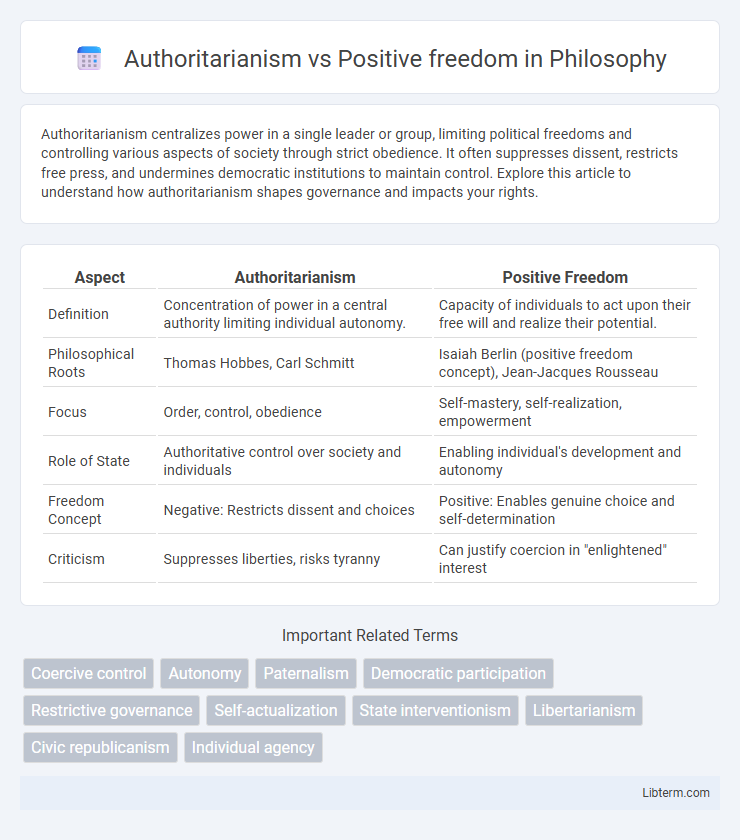Authoritarianism centralizes power in a single leader or group, limiting political freedoms and controlling various aspects of society through strict obedience. It often suppresses dissent, restricts free press, and undermines democratic institutions to maintain control. Explore this article to understand how authoritarianism shapes governance and impacts your rights.
Table of Comparison
| Aspect | Authoritarianism | Positive Freedom |
|---|---|---|
| Definition | Concentration of power in a central authority limiting individual autonomy. | Capacity of individuals to act upon their free will and realize their potential. |
| Philosophical Roots | Thomas Hobbes, Carl Schmitt | Isaiah Berlin (positive freedom concept), Jean-Jacques Rousseau |
| Focus | Order, control, obedience | Self-mastery, self-realization, empowerment |
| Role of State | Authoritative control over society and individuals | Enabling individual's development and autonomy |
| Freedom Concept | Negative: Restricts dissent and choices | Positive: Enables genuine choice and self-determination |
| Criticism | Suppresses liberties, risks tyranny | Can justify coercion in "enlightened" interest |
Defining Authoritarianism and Positive Freedom
Authoritarianism is defined as a political system characterized by concentrated power in a single authority or small group, limiting individual freedoms and enforcing strict obedience. Positive freedom refers to the capacity of individuals to act upon their free will, emphasizing self-mastery and the provision of conditions that enable personal development and autonomy. Contrasting these concepts highlights the tension between external control and internal empowerment within political and social frameworks.
Historical Origins of Authoritarianism
Authoritarianism originated in historical contexts marked by centralized power and limited political pluralism, often emerging during periods of social upheaval or state formation. Key examples include the rise of absolutist monarchies in early modern Europe and 20th-century totalitarian regimes such as fascist Italy and Stalinist Soviet Union. These regimes prioritized control and order over individual liberties, contrasting sharply with the concept of positive freedom, which emphasizes self-realization and empowerment within a participatory political framework.
The Evolution of Positive Freedom in Political Thought
The evolution of positive freedom in political thought emphasizes empowering individuals to realize their own potential through state intervention and social conditions that promote autonomy, contrasting sharply with authoritarianism's top-down control and suppression of personal liberties. Thinkers like Isaiah Berlin and Charles Taylor advanced the concept by highlighting the role of enabling environments, where citizens attain self-mastery and genuine choice beyond mere absence of restraint. This shift underscores a move from authoritarian models prioritizing order and obedience toward democratic frameworks fostering participatory governance and the expansion of substantive freedoms.
Central Characteristics of Authoritarian Regimes
Authoritarian regimes centralize power, limiting political pluralism and suppressing dissent through strict control of media and civil society. These governments often enforce uniformity by restricting individual rights and prioritizing state authority over personal autonomy, contrasting sharply with the concept of positive freedom, which emphasizes self-mastery and collective empowerment. Key features include a lack of transparent governance, restricted political participation, and use of coercive measures to maintain order and legitimacy.
Principles and Practices of Positive Freedom
Positive freedom emphasizes autonomy, self-mastery, and the capacity to act according to one's true desires, contrasting with authoritarianism's focus on control and obedience. It promotes the development of individual potential through participatory democracy, education, and access to resources that enable informed decision-making. Practices of positive freedom include empowering citizens to participate actively in governance, fostering critical thinking, and removing social and economic barriers that limit genuine self-determination.
Authoritarianism’s Impact on Individual Liberties
Authoritarianism significantly restricts individual liberties by centralizing power and limiting political pluralism, free speech, and personal autonomy. This governance style often suppresses dissent, curtails freedom of expression, and undermines civil rights to maintain control and social order. The erosion of democratic institutions under authoritarian regimes directly diminishes positive freedom, which emphasizes self-realization and active participation in collective decision-making.
Positive Freedom and Civic Participation
Positive freedom emphasizes individuals' ability to participate actively in civic life, fostering empowerment and self-governance through democratic engagement. This concept supports structures that enable access to education, public deliberation, and institutional transparency, ensuring citizens can influence political decisions effectively. Civic participation under positive freedom promotes collective autonomy, contrasting authoritarianism's restriction of individual agency and political involvement.
Societal Consequences of Authoritarian Governance
Authoritarian governance often leads to restricted individual liberties, suppressing political dissent and curtailing free expression, which undermines societal creativity and innovation. This governance style typically concentrates power within a narrow elite, resulting in systemic inequality, limited social mobility, and widespread human rights violations. Societal consequences include increased social unrest, erosion of public trust in institutions, and weakened democratic structures that inhibit positive freedom--the actual ability of individuals to pursue their true interests and self-realization.
Case Studies: Positive Freedom in Action
Case studies of positive freedom illustrate how empowering individuals through education, healthcare, and social welfare promotes autonomy and self-realization, contrasting sharply with authoritarian regimes that restrict personal liberties. Examples such as the Nordic countries highlight comprehensive social policies enabling citizens to pursue their potential without oppressive state control. These cases demonstrate positive freedom's role in fostering democratic participation and social equality within a framework of supportive institutions.
Authoritarianism vs Positive Freedom: Future Outlook
Authoritarianism restricts individual autonomy by centralizing power, limiting positive freedom's emphasis on self-realization and personal development. Future outlooks suggest increasing tensions between authoritarian regimes and movements advocating for positive freedom through democratic reforms and human rights. Technological advancements and global interconnectedness could either entrench authoritarian controls or empower individuals to expand their positive freedoms.
Authoritarianism Infographic

 libterm.com
libterm.com